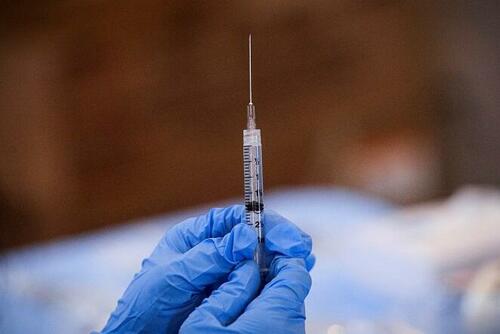
Authored by Zachary Stieber via The Epoch Times (emphasis ours),
Finland plans to offer avian influenza vaccinations as soon as the week of June 30 to some workers with exposure to animals, health authorities said on June 25. That would make it the first country in the world to do so.
The Nordic country has bought vaccines for 10,000 people, each consisting of two injections, as part of a joint European procurement of up to 40 million doses for 15 nations from manufacturer CSL Seqirus.
“The vaccine will be offered to those aged 18 or over who are at increased risk of contracting avian influenza due to their work or other circumstances,” the Finnish Institute for Health and Welfare said in a statement.
The H5N1 strain of avian influenza, or bird flu, has circulated for decades in birds but has recently jumped to other species, including cattle in the United States.
Three humans in the United States have had confirmed infections this year, while Finland has none.
However, Finnish authorities are rolling out the vaccine to try to curb the transmission of the virus.
“The conditions in Finland are very different in that we have fur farms where the animals can end up in contact with wildlife,” Dr. Hanna Nohynek, chief physician at the Finnish Institute for Health and Welfare, said.
The mostly open-air fur farms saw widespread outbreaks of bird flu among mink and foxes, leading to the culling of about 485,000 animals in 2023 to cut down on transmission risk.
Vaccinations are likely to start as early as next week, according to a spokesperson for the institute. People deemed at risk, including workers at the fur farms and lab technicians who handle bird flu samples, are eligible for the shots.
If any human infections are confirmed, people in close contact with the patients would also be offered the vaccine.
US Orders Vaccines
The U.S. government has ordered nearly 5 million doses of the influenza vaccine made by CSL, and manufacturing is slated to be completed by the end of the summer.
However, the U.S. government has no concrete plans yet to start vaccinating farm workers or others.
Dawn O’Connell, the assistant secretary for preparedness and response at the U.S. Administration for Strategic Preparedness and Response (ASPR), said in May that government officials were “looking closely” at moving forward with vaccinations. Still, the government has made no formal announcements on the front since then.
Robert Johnson, director of ASPR’s medical countermeasures program, was asked during a call with reporters on June 25 about Finland’s choice to start vaccinating some people. He said that ASPR and the U.S. Centers for Disease Control and Prevention are in agreement that H5N1 is currently a low public health risk.
“Further sort of deliberations or decisions around vaccine really will require further conversations around the U.S. government,” Dr. Demetre Daskalakis, a CDC official, told reporters.
In a strategy document released on June 25 aimed at a pandemic caused by influenza, U.S. officials said that vaccines “could be deployed before an outbreak begins and provide immune responses to a broad range of influenza viruses [and] could enable the population to have some level of protection against H5Nx viruses prior to a pandemic.”
Officials are backing the testing of multiple experimental vaccines against influenza, including two self-amplifying RNA vaccines targeting H5N1.
Pfizer and Moderna are also in talks with U.S. officials about messenger RNA vaccines against H5N1, after developing two widely used COVID-19 vaccines.
Although three farm workers in the United States have tested positive for H5N1 recently, officials have stressed that the illnesses are believed to have come from cows and that there are no signs as of yet of person-to-person transmission.
Reuters contributed to this report.
Authored by Zachary Stieber via The Epoch Times (emphasis ours),
Finland plans to offer avian influenza vaccinations as soon as the week of June 30 to some workers with exposure to animals, health authorities said on June 25. That would make it the first country in the world to do so.
The Nordic country has bought vaccines for 10,000 people, each consisting of two injections, as part of a joint European procurement of up to 40 million doses for 15 nations from manufacturer CSL Seqirus.
“The vaccine will be offered to those aged 18 or over who are at increased risk of contracting avian influenza due to their work or other circumstances,” the Finnish Institute for Health and Welfare said in a statement.
The H5N1 strain of avian influenza, or bird flu, has circulated for decades in birds but has recently jumped to other species, including cattle in the United States.
Three humans in the United States have had confirmed infections this year, while Finland has none.
However, Finnish authorities are rolling out the vaccine to try to curb the transmission of the virus.
“The conditions in Finland are very different in that we have fur farms where the animals can end up in contact with wildlife,” Dr. Hanna Nohynek, chief physician at the Finnish Institute for Health and Welfare, said.
The mostly open-air fur farms saw widespread outbreaks of bird flu among mink and foxes, leading to the culling of about 485,000 animals in 2023 to cut down on transmission risk.
Vaccinations are likely to start as early as next week, according to a spokesperson for the institute. People deemed at risk, including workers at the fur farms and lab technicians who handle bird flu samples, are eligible for the shots.
If any human infections are confirmed, people in close contact with the patients would also be offered the vaccine.
US Orders Vaccines
The U.S. government has ordered nearly 5 million doses of the influenza vaccine made by CSL, and manufacturing is slated to be completed by the end of the summer.
However, the U.S. government has no concrete plans yet to start vaccinating farm workers or others.
Dawn O’Connell, the assistant secretary for preparedness and response at the U.S. Administration for Strategic Preparedness and Response (ASPR), said in May that government officials were “looking closely” at moving forward with vaccinations. Still, the government has made no formal announcements on the front since then.
Robert Johnson, director of ASPR’s medical countermeasures program, was asked during a call with reporters on June 25 about Finland’s choice to start vaccinating some people. He said that ASPR and the U.S. Centers for Disease Control and Prevention are in agreement that H5N1 is currently a low public health risk.
“Further sort of deliberations or decisions around vaccine really will require further conversations around the U.S. government,” Dr. Demetre Daskalakis, a CDC official, told reporters.
In a strategy document released on June 25 aimed at a pandemic caused by influenza, U.S. officials said that vaccines “could be deployed before an outbreak begins and provide immune responses to a broad range of influenza viruses [and] could enable the population to have some level of protection against H5Nx viruses prior to a pandemic.”
Officials are backing the testing of multiple experimental vaccines against influenza, including two self-amplifying RNA vaccines targeting H5N1.
Pfizer and Moderna are also in talks with U.S. officials about messenger RNA vaccines against H5N1, after developing two widely used COVID-19 vaccines.
Although three farm workers in the United States have tested positive for H5N1 recently, officials have stressed that the illnesses are believed to have come from cows and that there are no signs as of yet of person-to-person transmission.
Reuters contributed to this report.
Loading…





